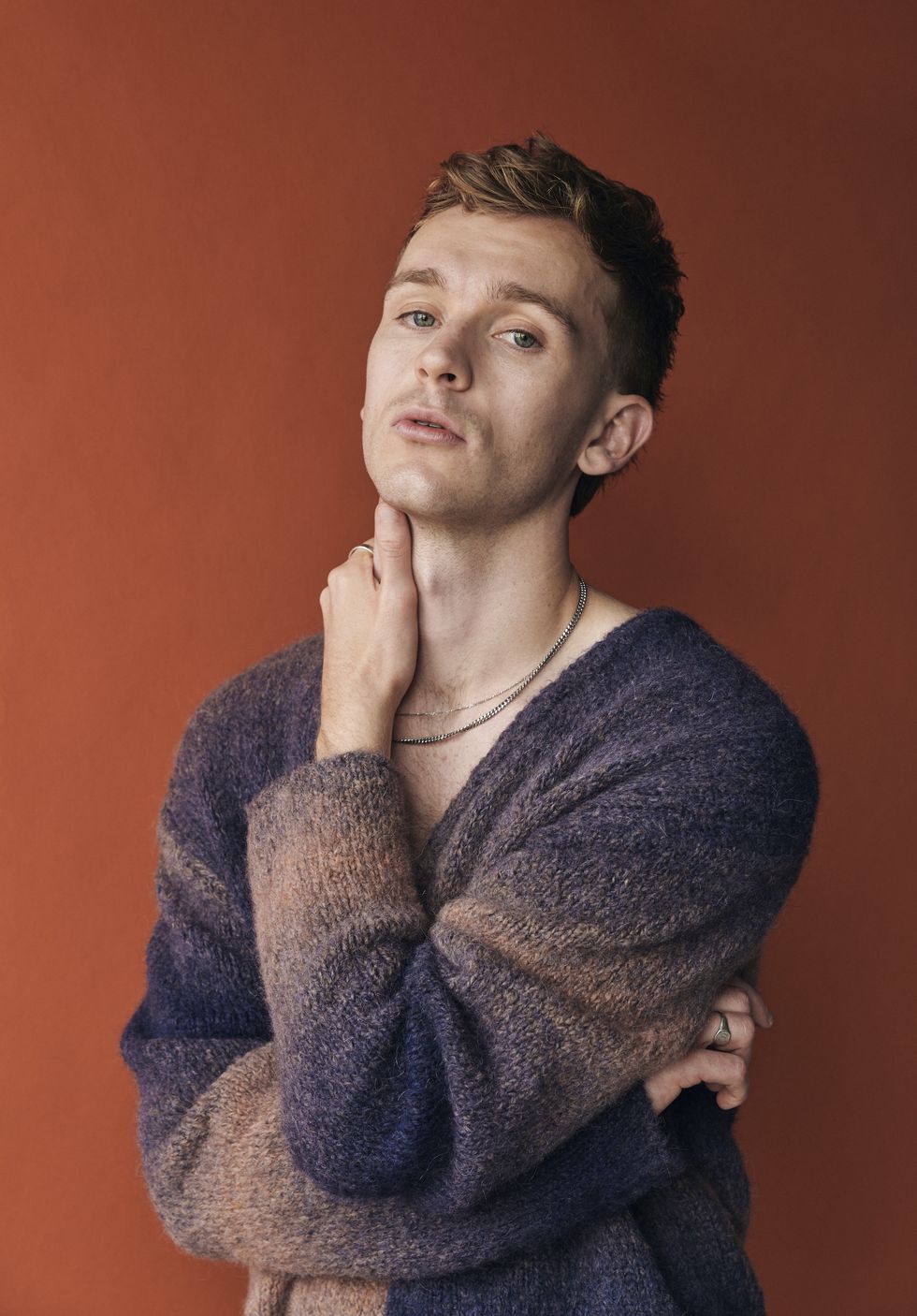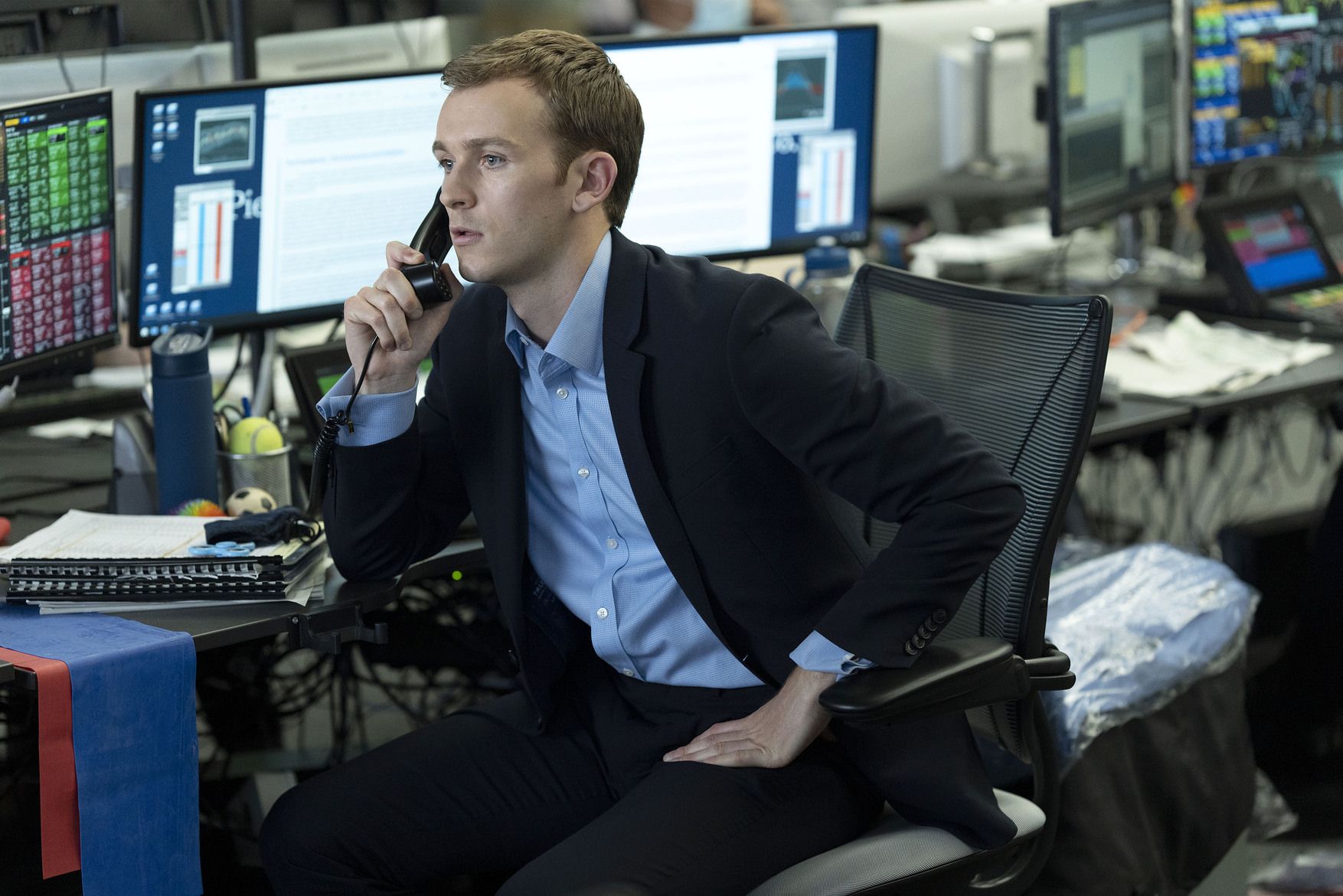Harry Lawtey knows a thing or two about spontaneity. Aged 13, he went from awe-inspired theatre kid watching in the crowd to attending Sylvia Young drama school in the span of four weeks. Lawtey spent most of his childhood on a military base in Cyprus (his dad is an aircraft engineer), and after a West End production of Oliver Twist came to town, he was transfixed. Fagin’s gang were almost entirely procured from the prestigious school, and seeing them up there set something in motion for Lawtey. The family were travelling back to London in two weeks’ time — just as Sylvia Young was holding auditions. Getting in would mean moving to London much earlier than anyone anticipated, but he believed in himself. “I had a sense of conviction to just go for it,” he says.
Risk and reward, and the messy tango between the two, are the core themes of Industry, the spiky financial drama where Lawtey plays fragile hellraiser Robert Spearing. In the world of Pierpoint & Co, the fictional institution at the heart of Industry, one’s fortunes can be raised up (and simultaneously razed to the ground) in the time it takes to gouge the foil off a scratch card. To succeed on the trading floor involves confidence, strategy, luck, knowledge, but also foolishness, lying, and manipulation. It doesn’t matter that the show, written by former investment bankers Mickey Down and Konrad Kay, unleashes finance-bro jargon (“buy the dip!” “short the VIX!”) so obscure that the only way of processing what’s happening is to switch on the subtitles. The greatest trick Industry ever pulled is making trading as high-octane and edge-of-the-seat tense as watching a car chase or a coronary artery bypass being performed before your eyes. “It’s stressful, but in a fun way,” says Lawtey.
Industry debuted in November 2020 and was a critical success. The graduates on the show, victims of their pressure-cooker workplace, became known for their dissolute champagne-and-coke rampages across the city, and we saw them routinely cycle through self-destruction like an ouroboros laced with gunpowder. It was less highbrow than Mad Men — the sex urgent, but also kind of gross, the work inert, the camaraderie spiked with poison. But the scheming inter-office politics mixed the Machevillian tendencies of Game of Thrones with the sacrifice-your-own-son brutality of Succession.
Industry’s second season picks up after COVID, jumping forward a couple of years as Pierpoint staff return to the office. Lawtey says party-boy Robert is impacted by the pandemic in a “more potent” way than the other characters. “He's had two years with no external validation, lots of introspection, and is trying to work out if he's genuinely happy.”
Lawtey’s own pandemic was more prosaic . He spent a lot of it with his family in Cyprus, and when Industry debuted, lockdown measures were still in place. “The cast all went on Zoom to celebrate, and have a chat, and we ended the call and that was it. And then my phone exploded. There was no kind of outlet for what I was feeling, which is a bit of a shame, really. Having said that, I can't complain too much.”
This self-effacement is common in conversion with Lawtey. When a director told him earlier this year his process was almost neurotic, he added that “every good actor [he’d] worked with is a bit neurotic.” Lawtey clarifies to me “that’s not to say that I'm a particularly good actor. I think we’re all treading a fine and shaky line between self-confidence and self-belief.” While Robert is in competition with no-one but himself, desperately trying to code-switch from his working class roots into the gilded, obnoxious spaces synonymous with wealth and power, Lawtey is far more rooted. Even his voice, deep and richer than most 25 year-olds, is flecked with the clipped, flat vowels (‘mum’, ‘chance’) of Barton-upon-Humber, near Hull, where he lived before they moved to Cyprus.
He’s had a chance to adjust since Industry came out. Filming season two was “Less exciting, but more fun,” he says, because the newness had worn off. “The first time, I felt massively out of my depth. Season two doesn’t have the same kind of novelty, but it was more enjoyable, because I didn't have to stress out so much about whether I was any good.”
While the show’s de-facto lead Harper (Myha’la Herrold) thrives at Pierpoint due to a nascent attraction to chaos, Robert flounders. “So much of all of his motivations are tied into the cycle of aspiration,” Lawtey notes, which includes his kinky tet-a-tet with colleague Yasmin, culminating last season in him ejaculating onto a mirror and eating it on her command. “He was in a very dark, desperate place towards the end of the first season. Now, he has to manage who he spends time with, because there's people in his life who can actually make him feel good, then there's people that he is perhaps more drawn to who are just not good for him.”
Though Robert largely resists the pull Yasmin has on him this season, there are what Lawtey calls “teething issues”. Robert has to court dormant Pierpoint client Nicola (Sarah Parrish), who last season sexually assaulted Harper and subsequently threw her under the bus. She sees a kindred spirit in his working class roots, and he sees someone who can help overcome his insecurities, but she is a dangerous ally. On Industry, every risk is a calculated one.
Lawtey’s work on Industry has not gone unnoticed; he’s due to appear alongside Christian Bale, Lucy Boynton and Gillian Anderson in Netflix horror The Pale Blue Eye, and he recently wrapped filming on Russell T Davies drama You and Me, which filmed in London this summer. He’s excited to make more shows the people around him can watch and enjoy, though he did watch Industry — including said mirror scene — with his parents in lockdown. “I just had to grin and bear it, because I wanted to share the show with them. There were a lot of tactical trips to get a biscuit, and not returning for nine minutes.”
He’s especially close with his family. A week before he left home to go to Sylvia Young, Lawtey was asked by his dad, who was having doubts, if this was the best idea after all. “He admitted he didn’t want me to go. He thought I might not be able to deal with it, that it might be too soon.”
But there was something 13-year-old Harry knew, deep down: it wasn’t about trying and succeeding, nor trying and failing. He loved his life in Cyprus. The trick was just to try. “I was determined to make it work,” he says. He defined success on his own terms: just wanting to make a success of it was, in his mind, a success in its own right. “Ultimately, it was a chance worth taking,” he says. No risk, no reward. “And it changed everything.”
The second season of Industry airs 27 September on BBC One and iPlayer.














